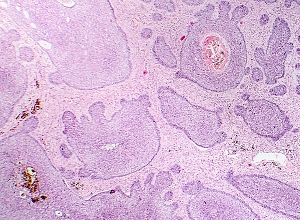The histone deacetylase (HDAC) inhibitor, remetinostat gel, is a well-tolerated and effective treatment for basal cell carcinoma (BCC), as an alternative to surgical excision, found a study in Clinical Cancer Research.
Basal cell carcinoma (BCC) is the most common form of skin cancer and is typically treated with surgical excision, explained study co-author Kavita Y Sarin. “While BCC is not associated with high mortality, surgical excision can be a costly and burdensome treatment, particularly for patients who develop multiple BCC lesions," she noted.
The study noted that a potential alternative strategy is to treat BCC with a topical cream; however, existing topical treatments for BCC are only effective for the superficial subtype of BCC, highlighting the need for more widely applicable topical treatments, Sarin explained.
She and her colleagues previously identified histone deacetylase (HDAC) inhibition as a promising therapeutic approach for BCC. In their latest study, a phase II clinical trial, they evaluated the safety and efficacy of the HDAC inhibitor remetinostat in adult patients with BCC. Unlike systemic HDAC inhibitors, which can be associated with various toxicities, remetinostat is designed to lose potency once it is absorbed beyond the skin, allowing its activity to be localised to the skin lesion.
The study enrolled 30 patients, each of whom had at least one BCC measuring 5 mm or greater in diameter at diagnosis. Ninety percent of patients identified as non-Hispanic white, and almost half had a prior history of skin cancer. Eight patients had multiple eligible tumours, resulting in a total of 49 tumours in the study. The tumours were found in both sun- exposed and non-exposed parts of the body, and the majority had either nodular or superficial histology.
Participants applied remetinostat gel to their tumours three times per day for six weeks. After eight weeks, any remaining tumour was surgically removed and examined histologically.
Of the 33 tumours included in the final analysis, 69.7% responded to the topical treatment, with 17 complete responses and six partial responses. On average, tumour diameter decreased by 62.3%, and tumour area decreased by 71.5%.
Responses were observed across multiple BCC subtypes: there was a 100% response rate among the six superficial BCC tumours in the analysis (five complete responses, one partial response), 68.2% response rate among 22 nodular BCCs (10 complete responses, five partial responses), and 66.7% among three infiltrative BCCs (two complete responses). No responses were observed in the two tumors of micronodular subtype.
There were no systemic or serious adverse events reported. The most reported adverse event was an eczema-like skin reaction at the site of remetinostat application.
"While further research is needed, our results suggest that remetinostat could be a safe and promising alternative to surgical treatment of BCC due to the high rate of complete responses we observed," said Sarin. "However, if a therapy is to replace surgical treatment, it needs to not only induce a complete response, but also a durable one." Future trials will examine the longevity of the response to remetinostat, she added.
"Our study also showed remetinostat's clinical efficacy against nodular BCC, one of the more common BCC subtypes. An ideal therapeutic for BCC should treat both nodular and superficial BCCs, and ideally the other subtypes as well."
Limitations of the study include the small sample size, its single-arm design, and the lack of durability data.
Study details
Phase II Open-Label, Single-Arm Trial to Investigate the Efficacy and Safety of Topical Remetinostat Gel in Patients with Basal Cell Carcinoma
James M. Kilgour, Aatman Shah, Nicole M. Urman, Shaundra Eichstadt, Hanh N. Do, Irene Bailey, Amar Mirza, Shufeng Li, Anthony E. Oro, Sumaira Z. Aasi and Kavita Y. Sarin
Published in AACR (American Association for Cancer Research) 6 August 2021 (Open access)
Abstract
Purpose
The mainstay of treatment for basal cell carcinoma (BCC) is surgical excision, which can result in significant associated morbidity, particularly for patients with recurrent tumours. We previously conducted a drug repositioning screen using molecular data from human BCCs and identified histone deacetylase (HDAC) inhibitors as a potential treatment for BCC. Here we conduct the first proof-of-principle study of a topical pan-HDAC inhibitor, remetinostat, in human BCC.
Patients and Methods
We conducted a phase II, open-label, single-arm, single-institution trial of a topical HDAC inhibitor. Participants with at least one BCC were recruited. All participants applied 1% remetinostat gel three times daily for 6 weeks, with measurements of tumour diameter conducted at baseline and week 8. Surgical excision of the remaining tumour was conducted at the end of the study and microscopic evaluation was performed.
Results
Thirty-three per-protocol tumours from 25 participants were included in the analysis. The overall response rate, defined as the proportion of tumors achieving more than 30% decrease in the longest diameter from baseline to week 8, was 69.7% [90% confidence interval (CI), 54%–82.5%]. On pathologic examination, 54.8% of tumours demonstrated complete resolution.
Pharmacodynamic analysis demonstrated similar levels of acetylated histone H3 in skin tissue before and after treatment, however, phosphorylation was increased. No systemic adverse events were reported.
Conclusions
The HDAC inhibitor remetinostat is a well-tolerated and effective topical treatment for reducing BCC disease burden in a clinically significant manner. This provides in-human validation of HDAC inhibitors as a therapy for BCC.
See more from MedicalBrief archives:
Potential treatment identified to target HFpEF
Five year efficacy of imiquimod in treating basal cell carcinoma
Topical creams effective in basal cell carcinoma

